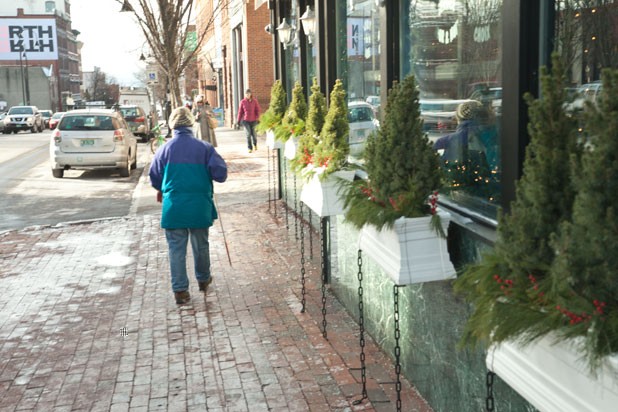
- Matthew Thorsen
- Chains hang from window boxes at Leunig’s to alert people with visual impairment
mmThe U.S. attorney’s office in Burlington usually sets its sights on embezzlers, child pornographers and drug traffickers. But some far less nefarious “offenders” have now come under its scrutiny: Vermont businesses guilty of providing cramped restrooms, too-narrow entryways and coat hooks hung out of reach of someone in a wheelchair.
The recent crackdown is part of a nationwide campaign by the U.S. Department of Justice (DOJ) to enforce long-ignored mandates of the Americans with Disabilities Act. In the last six months, at least a dozen Vermont businesses, including six restaurants and bars on Burlington’s Church Street, have been the subject of “compliance reviews” by the DOJ’s civil rights division. And while the violations cited were all relatively minor, often the cost of compliance is not, with upgrades sometimes running into the tens of thousands of dollars.
Nikolas Kerest, an assistant U.S. attorney and the DOJ’s civil rights coordinator in Burlington, has overseen the recent ADA enforcement actions. He says that most resulted from random inspections of local businesses rather than from citizen complaints. Nevertheless, Kerest says that civil rights enforcement, especially the rights of people with disabilities, has become “one of the top priorities” of the DOJ.
“The ADA is an important law,” Kerest says, “and we want businesses to realize that they need to come into compliance if they’re not already.”
In Vermont, that’s meant some decades-old businesses are suddenly being told they’re in violation of federal law. Burlington establishments caught in the feds’ dragnet include Church Street Tavern, Three Tomatoes, Red Square, the Scuffer Steak and Ale House, Ken’s Pizza and Leunig’s Bistro. None was fined or prosecuted for the violations, but all entered settlements with the U.S. attorney’s office in which they agreed to make the necessary upgrades.
Leunig’s co-owner Bob Conlon, who has worked at the restaurant at 115 Church St. since 1980, says that this was the first time Leunig’s has been inspected for ADA compliance and the violations came as a surprise to him. Fifteen years ago, the restaurant upgraded its bathrooms to make them more handicap accessible — or so he thought. “We thought it was pretty good, but it wasn’t enough,” he says.
In July, Leunig’s, which is located in a circa-1830 building, agreed to the DOJ-mandated upgrades, which included installing new automatic openers on the front door and restroom, new plumbing, and better signage for visually impaired patrons.
While Conlon isn’t thrilled by the new automatic opener on the front entrance — it allows a lot of cold air to blow in during the winter, he complains, and the button often gets hit by passing teenagers as a prank — he and his staff are dealing with it.
“My mother-in-law is in a wheelchair, and we have plenty of customers who come in with wheelchairs or are disabled,” Conlon says. “We want to accommodate them.” He estimates that the improvements cost between $8000 and $13,000.
“None of it was insurmountable and, luckily, we’ve been successful and can weather this,” Conlon adds. “But if you’re a marginal business and had to do this, it could really hurt you.”
Sam Handy, co-owner of the Scuffer at 148 Church Street, says the DOJ’s enforcement action in June came as a surprise to him, too. Handy has owned the business for just two years and assumed the previous owners had addressed such issues. The Scuffer was cited with “a pretty big list” of violations, he says, most of which relate to the age of the building, which dates to the 19th century. Among the violations: a front door that wasn’t wheelchair accessible and coat hooks that were too high.
Handy hasn’t estimated what it cost to comply, but he insists the Scuffer’s improvements will be completed shortly.
“The U.S. attorney was awesome. They were clear that it needed to be done, but at the same time they were here to help us,” Handy says. “Their doors were always open if we had any kind of questions about anything.”
It wasn’t just Burlington businesses — or those in historic buildings — that were cited. In July, Smugglers’ Notch Resort was cited for failure to offer a sufficient number of handicap-accessible parking spaces at its on-mountain lots for skiers and riders. Smuggs’ public relations director, Karen Boushie, estimates the cost of compliance at $10,000.
In August, the U.S. attorney’s office cited the Savoy Theater in Montpelier for not having assistive-listening devices for patrons with hearing impairments. Terrence Youk, owner of the Savoy, says he’s long been sensitive to ADA concerns. Shortly after purchasing the theater, in December 2009, he installed an ADA-compliant restroom.
But while Youk agrees that Kerest was “fair” in his dealings, he was irked that the U.S. attorney’s office issued a press release about the violation without any further details. According to Youk, the Savoy’s old sound system for the hearing impaired failed about a month before he was cited. Youk was shopping around for a new one, which cost him about $1700, when the DOJ popped him. As he puts it, “It would have been nice to have some warning that we were going to be publicly whipped.”
How often does the system get used? “Hardly ever,” Youk adds. “Probably once or twice a month at most.”
Although President George H. W. Bush signed the ADA into law in July 1990, disability-rights advocates say that enforcement of its provisions over the last 22 years has been spotty, with actions often taken only after repeated public complaints. During the eight years of the second Bush administration, enforcement of ADA’s provisions, and most civil rights laws generally, was a lower priority than concerns about terrorism.
Since President Obama’s election in 2008, however, the DOJ has taken a renewed interest in the ADA, advocates say, largely driven by Assistant U.S. Attorney General Thomas Perez, who has called the landmark law “one of the great civil rights laws of our generation.”
“The ADA has been on the books since 1990 and it’s not acceptable that, 20-plus years later, there’s still not a lot of compliance by businesses,” says AJ Ruben, supervising attorney for Disability Rights Vermont. In the last two years, his office has conducted hundreds of accessibility surveys of Vermont’s disaster shelters and polling places. While Ruben hasn’t compiled the results of those surveys yet, he says most are in compliance or close to it.
Disability-rights advocates point out that ADA noncompliance often has little to do with the size of the business or municipality. Kim Brittenham, community access coordinator for the Montpelier-based Vermont Center for Independent Living, notes that until the election of Burlington Mayor Miro Weinberger last March, Vermont’s largest city went years without an ADA coordinator on staff to field complaints and questions from the public.
“Without a coordinator,” Brittenham says, “that piece just wasn’t happening.”
Brittenham disagrees with the suggestion that complying with ADA can be prohibitively expensive. She points out that the law itself, as well as case law over the last 22 years, allows for the removal of physical barriers to access only if they’re “readily achievable” without undue financial hardship on a business.
“So if putting a ramp in is equivalent to what it costs to wash your windows or what you pay for landscaping, no court of law is going to think that’s too expensive,” she says. “But usually, the expense really isn’t that much. It’s just that nobody has looked at it. Nobody’s been made to look at it.”
Moreover, those costs don’t necessarily need to be borne exclusively by the business or building owner. Devin Colman, historic preservation review coordinator for the Vermont Agency of Commerce and Community Development, says that in the last five years, the state has awarded more than $5.5 million in tax credits to building owners and businesses to accommodate the ADA. That has paid for installing elevators, lifts, new bathrooms and wheelchair ramps.
“The state recognizes that if you’re a small business owner, this can be a financial burden,” he says, adding that historic buildings are not exempt from complying with ADA. “But it’s really important to ensure that everyone can use these buildings.”
While some accessibility issues cannot be easily addressed — for example, a historic bank building with a granite front entryway need not be chiseled out to allow for the passage of a wheelchair — with a little creativity, less invasive and less costly solutions are doable.
Evidently, Conlon found one. Following the ADA compliance survey of Leunig’s, he was informed that the restaurant’s window boxes along College Street had to be replaced with ones that didn’t protrude more than four inches from the wall. Why? Someone with a visual impairment could accidentally walk into them, the feds said.
Since smaller window boxes apparently don’t exist, Leunig’s has hung chains from the window boxes so that a person with a cane will notice they’re there.
While Conlon thought the requirement sounded a bit “silly,” the historic preservation expert points to it as an example of how ADA rules need not be “show stoppers” for businesses.
“It can be done,” Colman says. “Sometimes it just takes a little more planning and creative










Comments
Showing 1-1 of 1
Comments are closed.
From 2014-2020, Seven Days allowed readers to comment on all stories posted on our website. While we've appreciated the suggestions and insights, right now Seven Days is prioritizing our core mission — producing high-quality, responsible local journalism — over moderating online debates between readers.
To criticize, correct or praise our reporting, please send us a letter to the editor or send us a tip. We’ll check it out and report the results.
Online comments may return when we have better tech tools for managing them. Thanks for reading.